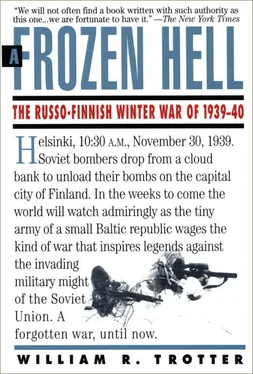The Soviet Union therefore demanded:
• that the frontier between Russia and Finland in the Karelian Isthmus region be moved westward to a point only 20 miles east of Viipuri, and that all existing fortifications on the Karelian Isthmus be destroyed;
• that the Finns cede to Russia the islands of Suursaari, Lavansaari, Tytarsaari, and Koivisto in the Gulf of Finland, along with most of the Rybachi Peninsula on the Arctic coast. In compensation for this, Stalin was willing to exchange 5,500 square kilometers of East Karelia, above Lake Ladoga;
• that the Finns lease to the USSR the peninsula of Hanko, and permit the Russians to establish a base there, manned by 5,000 troops and some support units.
In practical terms, such concessions would mean the abandonment of Finland’s main defense, the Mannerheim Line, leaving the country gravely weakened. Moreover, it was the opinion of nearly everyone in the Finnish government that these demands, as stunning as they were, were only the prelude to other, more severe demands—demands that the Finns would be powerless to reject because they would have already lost their strongest line of defense.
Foreign Minister Erkko in particular was convinced that Stalin was bluffing and that Finland needed only to stand fast and the Russians would back down. There were acrimonious discussions in Helsinki between Erkko, those who thought as he did, and Marshal Mannerheim, who kept insisting that the Russians meant what they said, would not hesitate to take what they wanted by force, and could not be stopped by Finland’s armed forces.
All through the rest of October and into November, negotiations continued. The Finns were willing to compromise slightly on the Isthmus border and were willing to cede some, but not all, of the gulf islands. As for giving the Russians a base at Hanko, on the Finnish mainland, that was quite unacceptable.
Subsequent events made Stalin look so much the villain in this unfolding scenario of intimidation that it is hard to shift one’s point of view to his side of the issue. But the effort reveals that some of his assumptions seem less paranoid than logical, and his demands, therefore, less outrageous than brutally realistic. He was, for example, absolutely accurate in his prediction that Germany would turn on the Soviet Union as soon as Hitler had achieved dominance in mainland Europe; his only mistake was in underestimating the timetable of events.
It is true that never in history had Leningrad (or St. Petersburg) been successfully attacked across the Karelian Isthmus, but the contingency existed, and the dazzling conquest of Poland had proved that if any army in the world could bring it off, it was the Wehrmacht. Stalin’s proposals were a direct attempt to head off that possibility, and from his point of view the demands on Finland were both moderate and made in transparent good faith. But the Finns believed that the wily Georgian, like some shrewd Oriental merchant, had merely initiated a process of haggling by setting his price much higher than what he was really willing to settle for.
Such does not appear to have been the case. When Stalin informed the Finnish delegation that those were his minimum demands, he was quite serious, and his dismay at the Finns’ hardheaded rejection was probably sincere. The stubborn and unrealistic stance adopted by the Finns appeared to Stalin as both perverse and downright suspicious. Surely the Finns must have had some kind of hidden motive for adopting such a provocative and belligerent policy; and since Finland’s own armed forces were so weak, that hidden motive might well be a secret alliance with Hitler.
For their part, the Finns too believed that things could not possibly be as straightforward as they were presented to be. Stalin’s proposals must have masked some darker and more sinister intention. One of Mannerheim’s best staff officers, General Öhquist, was brought into the picture to study the list of Russian demands from the military point of view, and he dismissed them: “No officer with modern training could take seriously the grounds for the demands they have put to us. More likely, what they are demanding now is only the preparation for further, far-reaching demands.”
His was a perceptive, if orthodox, analysis, as far as it went, but it overlooked one crucial fact: Joseph Stalin was not “an officer with modern training.” Every historical indication is that the Russian negotiators were genuinely thrown off balance and deeply surprised by the Finns’ intransigent response. If these original demands had been met, would Stalin then have tried to subjugate all of Finland? Would the Winter War have been fought? It is at least possible that Stalin himself did not know what his ultimate intentions toward Finland might be. The strongest argument against such a strategy of outright conquest is that it did not, in the event, happen—not after the Winter War nor even in 1944 when Stalin had every legitimate excuse to overrun the country, and could have done so with comparative ease.
Whether Stalin would truly have been satisfied with his initial “shopping list” is almost beside the point; ultimately, of course, these issues came back down to an irreducible case of right versus wrong. Finland was a sovereign nation, and it had every legal and moral right to refuse any Russian demands for territory. And the Soviet Union, for its part, had no legal or moral right to pursue its policies by means of armed aggression. Even Nikita Khrushchev admitted as much, decades later, although in the next breath he rationalized the invasion in the name of realpolitik: “There’s some question whether we had any legal or moral right for our actions against Finland. Of course we didn’t have any legal right. As far as morality is concerned, our desire to protect ourselves was ample justification in our own eyes.” [2] Crankshaw, Edward, ed., Khrushchev Remembers (Boston: Little, Brown, 1970), 152.
Russo-Finnish negotiations at the Kremlin went back and forth, round and round, and in the end got nowhere. At one of the final meetings, on November 3, Molotov dropped his mask of cool professionalism and snapped at the Finns: “Since we civilians don’t seem to be making any progress, perhaps it’s the soldiers’ turn to speak.”
On the morning of November 9, the Finnish delegates went for their final meeting with Stalin and Molotov. They communicated their government’s final, inflexible rejection, restating only the relatively minor compromises that had already been put on the table and turned down by the Russians. Stalin seemed unwilling to believe his ears and continued to explore possibilities for further compromise, speaking informally and with what seemed like urgent sincerity. But after an hour of futile discussion it was obvious to everyone that the whole business had come to a dead end. Each side bade farewell to the other. Since the Finnish delegates were clearly just as upset by this outcome as the Russians, the final meeting ended with remarkably little display of animosity by anyone. The actual parting, in fact, was almost jovial. Molotov waved and said, “Au revoir!” and Stalin shook hands all around and wished the Finns “all the best.” Then he went off to confer with his generals about how best to subdue this willful and obstinate little country.
It seems clear from Khrushchev’s memoirs as well as other postwar Soviet documents that the Red Army planners were caught off guard by the Finns’ intransigence. True, the Russians had made numerous military preparations, but those had been predicated on the contingency of a major European power moving into Finland. Little serious thought had been given to the prospect of a war against Finland alone. Now the situation had changed radically. Whatever Stalin’s personal inclinations toward Finland—and at the start of negotiations, they were comparatively benign—a war of some sort now seemed inevitable.
Читать дальше












